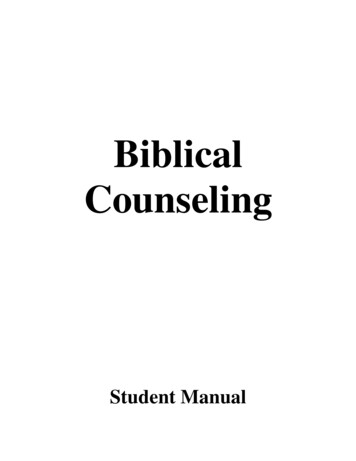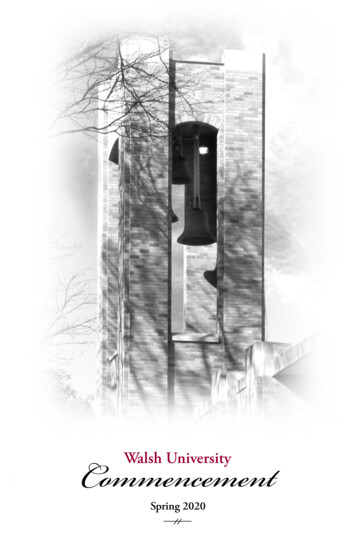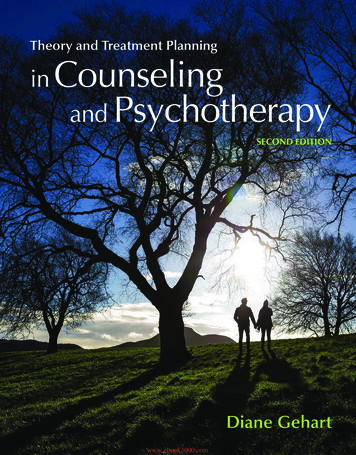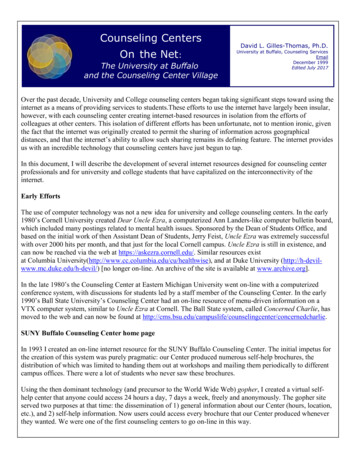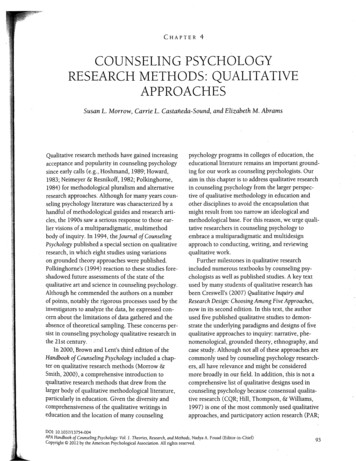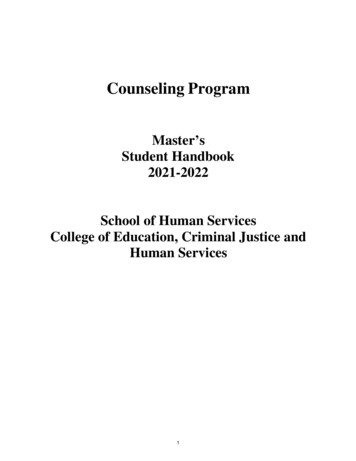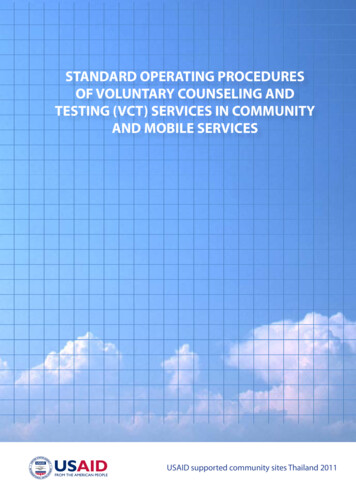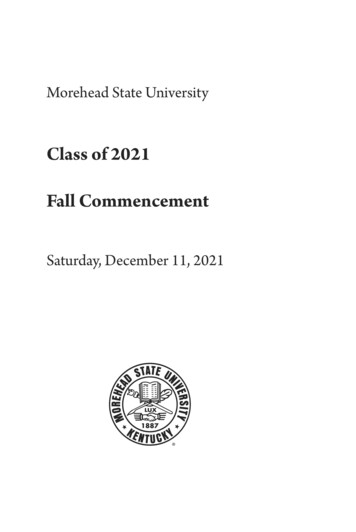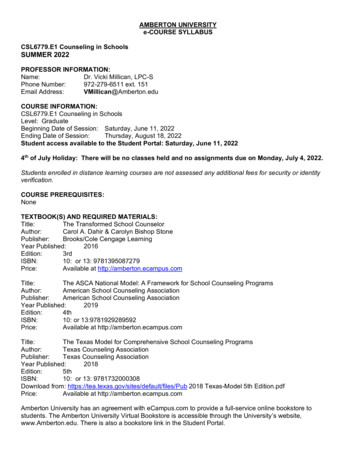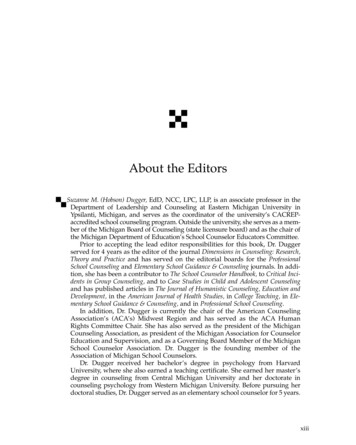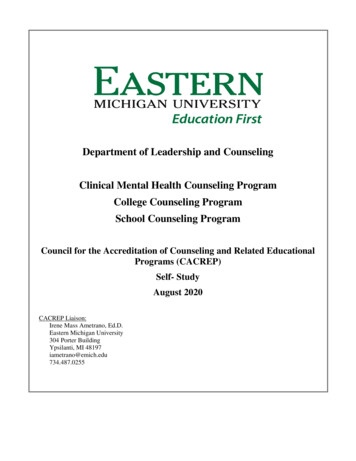
Transcription
Department of Leadership and CounselingClinical Mental Health Counseling ProgramCollege Counseling ProgramSchool Counseling ProgramCouncil for the Accreditation of Counseling and Related EducationalPrograms (CACREP)Self- StudyAugust 2020CACREP Liaison:Irene Mass Ametrano, Ed.D.Eastern Michigan University304 Porter BuildingYpsilanti, MI 48197iametrano@emich.edu734.487.0255
2Table of Contents(Hyperlinks go directly to the identified section of this document)Application for AccreditationSection 1: Specialty Areas OfferedSection 2: Signature PagesSection 3 Required Supplemental Documentation4Programs of Study4Table 1 Faculty Who Currently Teach in Program5Table 2 Current Students7Table 3 Graduates7Institutional accreditation8Section 1: The Learning Environment: Structure and Evaluation9The Institution (A – I)9The Academic Unit (J – V)15Faculty and Staff (W – DD)22Section 2: Professional Counseling Identity26Foundation (A – C)26Counseling Curriculum (D - F)29Common Core Curricular Experiences30Professional Orientation and Ethical Practice31Social and Cultural Diversity32Human Growth and Development33Career Development34Helping Relationships35Group Work36Assessment37Research and Program Evaluation39Section 3: Professional Practice40Entry-level Professional Practice (A-E)40Practicum (F - I)42Internship (J-M)42Supervisor Qualifications (N – R)43
3Table of Contents (cont’d)Practicum and Internship Course Loads (S – V)44Section 4: Evaluation in the Program46Evaluation of the Program (A – E)46Assessment of Students (F – H)52Evaluation of Faculty and Supervisors (I – K)56Section 5: Entry Level Specialty Areas58Clinical Mental Health Counseling58Student Affairs and College Counseling63School Counseling68
4Return to Table of ContentsSection 3Required Supplemental Documentation1. Please list each site and delivery method where the specialty area(s) is offeredThe only site where the Clinical Mental Health, School, and College Counseling programsare offered is at the main Eastern Michigan University campus in Ypsilanti. Courses areoffered in a variety of formats. While the majority of classes are on campus, some are offeredin a hybrid format, and a few are fully online. (Note that during the COVID 19 pandemic, allcourses, including practicum and internship are being offered online, using both synchronousand asynchronous formats)2. Please provide a current program of study for each specialty area that includes allrequired courses and indicates the total number of hours required to obtain the degree.This information should also include the number of clinical hours required in practicumand internship courses.Attached are programs of study for the school counseling (teacher-certified and non-teachercertified), College Counseling, and Clinical Mental Health Counseling. School counselingstudents who are not certified teachers are required to take additional coursework.3. Please create tables or charts with the following information.a) Table 1 – Faculty Who Currently Teach in the Program1. List all core faculty by name and include each person’s credit hours taught in last12 months, terminal degree and major, primary teaching focus, professionalmemberships, licenses/ certifications and nature of involvement in the program(s)(e.g., academic unit leader)2. List all noncore faculty by name and include each person’s credit hours taught inlast 12 months, terminal degree and major, primary teaching focus, professionalmemberships, licenses/ certifications and nature of involvement in the program(s)(e.g., clinical faculty, adjunct)See the following pages for tables reflecting core faculty and noncore (adjunct) faculty,current students, and graduate
53a. Table 1: Core Faculty Who Currently Teach in the ProgramCredit HoursTaughtTerminal DegreeFaculty Member (WI 19-WI 20) & MajorTeaching FocusProfessionalMembershipsLicenses /CertificationsNature ofInvolvement inProgramAmetrano, IreneM.26Ed.D,CounselingPsychologyEthical, Legal and Professional Issues,Crisis Intervention, Advanced TreatmentPlanning, Counseling Process, Practicumand Internship SupervisionACA, AMHCA,ACES, MMHCA,MACES,LPC (MI),NCC, ACSProgram Coordinatorand Coordinator ofAdvising; CACREPLiaisonBounds, PatriceS.31Ph.D.CounselorEducation andSupervisionCareer Counseling, Research inCounseling, Assessment in Counseling;Diagnosis and Treatment Planning,Counseling with Children; Post-SecondaryPlanningACA, ACES,NCACES, Chi SigmaIotaLPC (MI),LCPC (IL)NCC, ACSSchool CounselingProgram Coordinator,Coordinator ofSchool BasedCounseling Clinic,CSI Faculty AdvisorChoudhuri,Devika, D.37Ph.D,CounselorEducation andSupervisionMulticultural Counseling, GroupCounseling, Couple and FamilyCounseling, Trauma, Sexuality,Counseling Process, Counseling Practicumand Internship SupervisionACA, ACES,AMHCA, AMCD,ALGBT, EMDRInternational Assoc.LPC ( CT.MI)Clinical MentalNCC, ACS,Health CounselingCCMHC,Program CoordinatorCertifiedEMDR(EMDRIA),Disaster MentalHealth (RedCross)Francis, Perry C.9Ed.D,CounselorEducationEthical, Legal and Professional Issues,Group Counseling, Crisis Intervention,Counseling Process, Research inCounselingACA, ACCA, ACESLPC (MI),NCC, ACSCoordinator ofCounselor TrainingClinic, CollegeCounseling ProgramCoordinator
63a. Table 1: Noncore Faculty Who Taught in the Program (Jan. 2019 – April 2020)CreditHoursTaughtNonCore Faculty (WI 19-WIMember20)Baker, Rotesa14TerminalDegree &MajorTeaching FocusProfessionalMembershipsLicenses /CertificationsNature ofInvolvement inProgramAdjunct facultyM.A. CommunityCounselingBasic Skills, Life Development, CaseManagementACA, ACES,MMHCA, MCA,MACES, ChiSigma IotaLPC,NCC,ACA, AMHCA,Chi Sigma IotaLPCBrantley-Gilbert,Brooke3M.A. ClinicalMental HealthCounselingBasic SkillsDougherty, Sean3M.A. SchoolCounselingSchool CounselingASCA, MACAC,ASCD,ACSAdjunct facultyLPC, NCCOakland CAHermon, David3Ph.D. CounselorEducationTheories of CounselingMoskal, Mark3MA, CommunityCounselingSubstance Abuse Counseling10Ph.D, CounselorEducation andSupervisionBasic skills, Practicum and InternshipSupervisionACA, ACES,MACES, MCA,and MSCAACS, LPC,LP, andPCC-SAdjunct Faculty(Core faculty until2018)3Ph.D. CounselingPsychologyAssessment in CounselingACA, ACES,SACES, TCA,TACESLPC, LP, ACS,BC-TMHAdjunct facultyParfitt, DianeQuarto, ChrisACA, ACES,ASGW, NCDA,SACES, ChiSigma IotaLPCAdjunct facultyLPC,CAADCAdjunct faculty
7Return to Table of ContentsTable 2: Current StudentsPlease indicate for each applicant program (e.g., School Counseling), the number of full-time,part-time, and full time equivalent (FTE) students at each campus site.Part-Time Students (Fall 2019-Winter 2020)Part-time is fewer than 8 credit hoursWI 2044017CollegeCMHCSchoolFA 1943015Full-Time Students (Fall 2019-Winter 2020)Full-time is 8 credit hours or moreWI 20FA 19College24CMHC1418School98Full-Time Equivalent Students (Fall 2019-Winter 2020)Calculation for FTE students in each program: Total SCH for students in eachprogram was divided by 8 (definition of a full-time student)WI 2054421CollegeCMHCSchoolFA 1974017Table 3 – Graduates for the past Three YearsPlease indicate for each applicant program, the number graduates at each campus site.Summer 2017 (August 2017) – Winter 2020 (April 2020)SemesterApplicant ProgramCollegeSU 19 – WI 202SU 18 – WI 19SU 17- WI 18TotalsSchoolClinicalMentalHealth4411211741521
8Return to Table of Contents4.Please provide evidence of institutional accreditation by a regional accreditor recognizedby the US Department of Education or the Council for Higher Education Accreditation(CHEA).See Policy 8.b.Eastern Michigan University is accredited by the Higher Learning Commission. Thisaccreditation is noted on the university’s homepage and on the Higher Learning Commissionwebsite.
9Return to Table of Contents2016 CACREP STANDARDSSECTION I: THE LEARNING ENVIRONMENTThe following Standards apply to all entry-level and doctoral-level programs for whichaccreditation is being sought unless otherwise specified.THE INSTITUTIONA. The academic unit is clearly identified as part of the institution’s graduate degreeofferings and has primary responsibility for the preparation of students in the program.If more than one academic unit has responsibility for the preparation of students in theprogram, the respective areas of responsibility and the relationships among and betweenthem must be clearly documented.The Graduate School website clearly identifies the Clinical Mental Health, College, and SchoolCounseling Programs, as master’s degree programs of study within the Department ofLeadership and Counseling in the College of Education.The Counseling Program within the Department of Leadership and Counseling is the onlyacademic unit at Eastern Michigan University that has responsibility for preparing students incounseling. While students may take some elective coursework in other departments andcolleges, the Counseling faculty make all admission, retention, and exit decisions, and assumeresponsibilities for advising and program development.B. The institutional media accurately describe the academic unit and, the core counseloreducation program faculty, each program and specialty area offered, includingadmissions criteria, accreditation status, methods of instruction, minimum degreerequirements, matriculation requirements, and financial aid information.The Department of Leadership and Counseling consists of three counseling master’s degreeprograms (clinical mental health, school, and college counseling), as well as leadershipprograms at the master’s, specialist’s, and doctoral levels.The Leadership and Counseling website and the Eastern Michigan University online GraduateSchool Catalog provide extensive information about the counseling programs: Clinical MentalHealth Counseling, College Counseling, and School Counseling, admission requirements andprocess, accreditation status. Links to core program faculty and other program information arefound on the program home page. Accreditation status is also indicated on the programwebsite.Financial aid information for graduate students in all departments is available on the GraduateSchool website and the Office of Financial Aid website.
10Return to Table of ContentsC. The institution is committed to providing the program with sufficient financial support toensure continuity, quality, and effectiveness in all of the program’s learningenvironments.While the institution remains committed to providing the program with sufficient financialsupport, the overall budgets of all departments in the university have not seen increases in thepast few years.The overall Department of Leadership & Counseling operations and personnel budget for FY2020 is slightly under 2 million ( 1,974,619), while expenses are slightly above that( 2,212,615) . It is important to note that the adjunct instructors (non-core faculty) are fundedby the Dean’s office, and that is not reflected in the attached budget. Thus the Department isnot operating in deficit.Half of the Department budget reflects all Leadership and Counseling faculty lines, four whichare full-time faculty lines in Counseling. The Department is supported by 2 full-time supportstaff, 5-8 work study students, and four graduate assistants (assigned to Counseling faculty). 750 per faculty member is allocated for faculty travel/faculty development, however anadditional 500- 700 is available for each faculty member from the department restrictedaccount fund when neededD. The institution provides opportunities for graduate assistantships for program studentsthat are commensurate with graduate assistantship opportunities in other clinicalprograms in the institution.The Eastern Michigan University Counseling Program receives an equitable number ofgraduate assistantships as compared to other degree programs.As shown in the table below, the Department has been able to offer about four graduateassistantships per year. Graduate assistants are typically counseling program students andprimarily serve the counseling faculty. In addition to assistantships in the Department, many ofour students received assistantships in other offices on campus such as the Office of Wellnessand Community Responsibility, Counseling and Psychological Services, Holman LearningCenterGraduate Assistantships by YearAcademic YearGraduate rce: Department records
11Return to Table of ContentsE. The institution provides encouragement and support for counselor education programfaculty to participate in professional organizations and activities (e.g., professional travel,research, and leadership positions), scholarly activities, and service to the profession.The University provides faculty with an extensive network of support that encouragesparticipation in professional organizations and activities. The Division of Academic andStudent Affairs offers numerous awards that encourage faculty research and scholarly activity.Research development is supported by the Provost's Internal Research Awards; ORDA(Research Development and Administration) Workshops and Services, and Consultation withORDA research development and pre-award officersInternal research funding awards include the Faculty Research Fellowship, Sabbatical Leave,Summer Research/Creative Activity Award, Provost's Research Support Award, James H.Brickley Endowment for Faculty Professional Development and Innovation, Dedicated Timefor Scholarly/Creative Activity program, and the Undergraduate Research Stimulus Program.The Office of Research Development and Administration (ORDA) supports faculty seekingfunding from external agencies. Dedicated time for proposal development provides facultywith released time for the development of grant proposals for submission to external fundingagencies. Consultation is available for faculty and graduate students on research and instrumentdesign, instrument validation, sample selection and sampling methods, data collection, dataanalysis, results interpretation and display.More complete descriptions of these programs are available on the Office of ResearchDevelopment and Administration website.At the Department level, faculty are encouraged to join professional organizations, attendconferences and workshops, and present at professional meetings as part of their professionalresponsibilities. 750 per faculty member is allocated for faculty travel/faculty development,travel to professional meetings, professional memberships, and/or books and other materials tosupport their teaching and scholarship. An additional 500- 700 is available for each facultymember from the department restricted account fund when needed. Faculty CVs reflect theextent to which faculty are professionally involved and have assumed leadership positions atthe State and National levels.F. The institution provides learning resources appropriate for scholarly inquiry, study, andresearch relevant to counseling and accessible by all counselor education program facultyand students.The Halle Library opened in 1998. This facility provides faculty and students with anextensive array of information resources and instructional services and resources to supportscholarly inquiry, study, and research. The current collection of print and electronic materialsincludes the following:Volumes heldDescription689402BooksPrint53717Government DocumentsPrint
12177483Bound PeriodicalsPrint920602Total (Books/Gov Docs/ Bound Periodicals)PrintFull Text nt Documentselectronic137499Total E-bookselectronic274998Journal Subscriptions179Current Journal SubscriptionsPrint4Microform Journal SubscriptionsMicroform60295Library pays some fee for accessElectronic38667Free accessElectronic99145Total (Journals Received)Print/Micro/Electronic263Indexes and otal (Microforms)Microforms9187Audio ItemsCDs19Audio ItemsAudiocassettes1,208Audio ItemsLPs10,414Total (Audio Items)7616Video ItemsVideocassettes3793Video ItemsDVD81Video ItemsVideodiscs11490Total (Video Items)Services that are available to help faculty and students find and use the Library’s resourcesinclude in-person, online, and telephone assistance; in-depth consultations; instruction onlibrary research that is customized to meet individual class needs; and interlibrary loan anddocument library for materials not available in the Library. An academic liaison program linksa faculty member in each department with the librarian specializing in the department’s subjectarea. Faculty and students can search the Library’s databases from computers on or of
13Return to Table of Contentscampus. Additional information about the Library’s extensive array of services is available onthe Halle Library website.Faculty Development CenterThe Bruce K. Nelson Faculty Development Center supports faculty’s teaching, learning, andresearch needs. They provide professional development services to all tenure-track, tenured,and emeritus faculty, full-time and part-time lecturers, and instructional graduateassistants. Examples of services include consultations on teaching and learning issues,workshops on a range of teaching and learning topics, technology training, mid-semesterstudent feedback, teaching portfolio reviews, scholarship of teaching and learning seminars,and so on.G. The institution provides technical support to all counselor education program faculty andstudents to ensure access to information systems for learning, teaching, and research.The mission of the Division of Information and Technology (IT) is to support students,faculty, and staff by providing information technologies that align teaching, learning,scholarly/creative activities, and administrative services with the University's mission. TheDivision of Information Technology is a valued partner in the operational and strategic use ofinformation and instructional technology through creative innovation, operational reliability,and supportive leadership.Faculty members receive new computers every four years through the Computer RefreshProgramSince 2013, Eastern Michigan University has committed to standardizing the classroomtechnology across campus classrooms. Information Technology and Physical Plant haveworked with the Provost’s Office, the Education Environment and Facilities Committee and theAcademic I.T. Advisory committee to implement the following configuration: Large screen television or projector BluRay player Document camera Auxiliary VGA and HDMI cables In-ceiling or wall-mounted speakers Windows-based thin-client computer Touch screen control panelTech support is available when classes are in session.In addition, the Division of Information Technology provides students and faculty support inusing our online environment (Canvas) through training, resource development andinstructional design. The Faculty Development Center also offers workshops for facultyregarding best practices for online teachingH. The institution provides information to students in the program about personal counselingservices provided by professionals other than counselor education program faculty andstudents.The university makes personal counseling services available to all students through Counselingand Psychological Services (CAPS). The staff provides free, confidential counseling using a
14Return to Table of Contentsshort-term model and limited psychiatry appointments for medication (insurance or payment isrequired) Available services include: Individual, couples and group counseling, Emergencyservices and crisis intervention, educational workshops, outreach, faculty and staffconsultation, and training for graduate students in the mental health professions No counselingfaculty member is on the staff at Counseling Services. Although College Counseling studentsmay do their internships at CAPS, there are eight professional staff members and severalpsychology department interns who are not associated with this academic department.I. The institution provides adequate and appropriate access to counseling instructionenvironments (on or off campus) that are conducive to training and supervision ofindividual and group counseling. The counseling instruction environments includetechnologies and other observational capabilities as well as procedures for maintainingprivacy and confidentiality.The College of Education Clinical Suite houses the EMU Counseling Training Clinic (CTC)operated by the Department of Leadership and Counseling and the EMU Speech and HearingTraining Clinic (operated by the Department of Special Education). The operation of theCounseling Clinic is managed by the Counseling Clinic Coordinator, who is a member of theCounseling Program faculty, in consultation with the faculty of the Counseling Program.The facility is very well-equipped to provide counseling services to clients, training, andsupervision. The clinical suite includes a waiting/reception area, one classroom, and arecords/reception office containing locked storage for client files. The CTC portion of the suitehas an office for the administrative activities of the Counseling Clinic Coordinator, fiveindividual counseling rooms, two group counseling rooms, a play therapy room with anattached observation room, and two videoconference rooms. All counseling rooms areequipped with video recording equipment. All rooms are wheelchair accessible.The COE Clinical Suite recently updated its recording equipment at the cost of 270,000. Eachconsultation room is equipped with two digital cameras with zoom capability and a high qualitymicrophone. Each group room and the play therapy room is equipped with four cameras and ahigh quality microphone. The recordings are stored on dedicated CAE servers located in themain server room of the university. Access to these recordings requires password authorizationprovided by the CTC director or the CTC graduate assistant and a university email account.The CTC utilizes an electronic medical record program (Titanium), and practicum students aretrained in the use of Titanium. Thus they gain hands-on experience in using an electronicmedical records system (Titanium) that is used by the majority of college counseling centersacross the United States. Access to the program requires prior authorization and an assignedpassword managed by the CTC director and CTC clinic graduate assistant. The program ismaintained on university servers and is not on the public side of the university webpage. Theprotection of client confidentiality is assured by restricted access to the videoconference rooms,locked storage of client files, restricted access to the records room, and the COE ClinicalSuite’s voluntary compliance with the HIPAA standards for privacy.SBCC: In addition, students have opportunities to provide clinical counseling services as partof their practicum hours, to students in several local public schools through the School BasedCounseling Training Clinic (SBCTC). While the technology at the SBCTC is not assophisticated as it is in the CTC, students do video record all sessions for use in supervision
15Return to Table of ContentsCTC and SBCC policies and procedures are described extensively in The Counseling TrainingClinic Manual, and the School Based Counseling Clinic Manual.THE ACADEMIC UNITJ. Entry-level degree programs in Addiction Counseling; Clinical Mental HealthCounseling; Clinical Rehabilitation Counseling; and Marriage, Couple, and FamilyCounseling consist of approved, graduate-level study with a minimum of 60 semestercredit hours or 90 quarter credit hours required of all students. Until June 30, 2020**,Career Counseling, College Counseling and Student Affairs, and School Counselingspecialty areas require a minimum of 48 semester credit hours or 72-quarter hours.Beginning July 1, 2020**, all entry-level degree programs require a minimum of 60semester credit hours or 90 quarter credit hours for all students. (**now 2023)The Clinical Mental Health Counseling and College Counseling Programs are comprised of 60semester hours of approved graduate-level study. The School Counseling Program iscomprised of 50 to 56 semester hours of approved graduate-level study, depending on whetherthe students has a valid Michigan teaching certificate. School counseling students who are notteacher-certified, have additional course requirements. The School Counseling program is inthe process of transitioning to 60 credits. These requirements are outlined on programs ofstudy, in the Counseling Student Handbook (Chap.6) and, as described previously, in theGraduate catalog.K. The academic unit makes continuous and systematic efforts to attract, enroll, and retain adiverse group of students and to create and support an inclusive learning community.Recruiting and retaining a diverse group of students has been a continuous goal of the programfaculty. Eastern’s location in the Detroit Corridor in Southeast Michigan has been very helpfulin this endeavor. Diverse applicants are attracted to Eastern because of its convenience and itsreputation for being welcoming and inclusive. We have a representation of EuropeanAmerican, African American, Arab American, Asian and LatinX students in proportion withregional demographics. Data from 2017 – 2019 indicate that approximately 35% of enrolledstudents are students of color. The number of female students continues to far exceed thenumber of male students.Being one of the oldest established counseling programs in the area, accredited first byCACREP in the early 1990’s, we have a large number of alumni working in schools, colleges,agencies, and private practices who refer applicants to us. A significant number of our studentsreceived referrals from alumni, who valued our approach to diversity. In addition, manyundergraduate students from Eastern who are psychology, criminal justice, social work, orwomen and gender studies majors, hear about our program through the work of our faculty andare attracted.Currently, program faculty serve in University leadership roles with Student Government andthe President’s Commission on Diversity and Inclusion. In addition, we maintain close tieswith campus programs that work with diverse students, including the Disability ResourceCenter, Academic Success Programs that support marginalized students, BrotherHOOD &SisterHOOD progams for men and women students of color, LGBTQ Resource Center, and theWomen’s Resource Center, and often recruit potential applicants. Our graduate students run
16Return to Table of Contentsworkshops and support groups for many of these students on campus such as a #MeToosupport group for survivors of sexual aggression and a Autism Support group. We demonstratethat we do not simply use diversity slogans but are intentional about our work. We have striven to have a diverse faculty , which in turn attracts diverse students.Currently, the counseling faculty represent a diversity of race, gender, religion, andsexual orientation, including African American, South Asian, European American,cisfemale, cismale, Buddhist, Jewish, Christian, heterosexual, lesbian and bisexualidentities. Program faculty attend Graduate Open House events where potential applicants perusethe various program offerings and talk one-on-one with faculty. We advertise toregional agencies and school districts. We attend career fairs in nearby institutions suchas the University of Michigan’s Department of Psychology Career Fair. We are timelyin our responsiveness to applicants, reviewing admission materials as they come inyear-round, and hold a two-phase admission process, which includes group interviews.While we only admit students in Fall and Winter, students can take beginning andelective courses prior to being program admitted. This allows them to make informeddecisions about their interest and ability to succeed. Our efforts to create an inclusive learning community that supports and retains diversestudents is centered in our philosophy to support adult learners for whom a graduateprogram is one component of a complex life. We offer courses that meet once a week inthe evening so full time workers can participate. We do not encourage students to takemore than three courses in fall and winter and one each in summer terms, because wewant them to be able to sustain their efforts over time rather than burning out. Weencourage self-directed projects and topics in courses as well as independent studies,which allow students to focus on their communities and areas they are passionate about.We are flexible and responsive to student needs so that elective and specializationcourses can be taken in a variety of arenas. For example, a student who is a veteran andwishes to work as a VA counselor, would be encouraged to find elective courseworkthat prepares them to work effectively with military populations, as well as directingtheir topics in courses such as career counseling or group work to focus on a veteranpopulation. Students with disabilities are encouraged to work with the DisabilitiesResource Center and we honor accommodations requested as a matter of course. Inaddition, we also work to make the learning environment relevant and topical so that itmeets the needs of students. We address current ethical issues and dilemmas, and offerelective coursework in topics such as spirituality, sexuality, and trauma-informedpractice.L. Entry-level Admission decision recommendations are made by the academic unit’sselection committee and include consideration of each applicant’s 1) relevance of careergoals, (2) aptitude for graduate-level study, (3) potential success in forming effectivecounseling relationships, and (4) respect for cultural differences.All regular program faculty participate in the program admission decisions. In the first phaseof the process, faculty members from each program area conduct a "paper screening" ofapplica
Attached are programs of study for the school counseling (teacher-certified and non-teacher certified), College Counseling, and Clinical Mental Health Counseling. School counseling students who are not certified teachers are required to take additional coursework. 3. Please create tables or charts with the following information.
